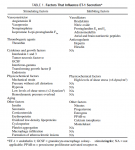Emootje
Senior Member
- Messages
- 356
- Location
- The Netherlands
Please watch my youtube video.
http://www.youtube.com/watch?v=QOCtf4zsdeI
http://www.youtube.com/watch?v=QOCtf4zsdeI
The Kennedy group found no elevation of ET-1 in CFS:
http://rheumatology.oxfordjournals.org/content/43/2/252.full.pdf html
Still thinking that ANP plays a major role in ME/CFS's volume depletion. Prostaglandins (PGF2 alpha, PGE2) and oxidative stress (MAPK p38, PKC) can increase ANP without increasing ET-1.
http://cardiovascres.oxfordjournals.org/content/cardiovascres/68/1/8.full.pdf
Maybe this means that they were relatively well-rested. Perhaps levels would be different after exertion?ET-1 levels were measured from a morning blood sample.
stimulates aldosterone secretion, decreases renal blood flow and glomerular filtration rate, and releases atrial natriuretic peptide (ANP).
